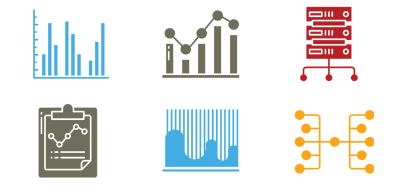Maximizing the Impact of Data from UW-Madison
Data generated by UW-Madison is a valuable asset for academic researchers and commercial partners. To maximize its potential, data can be used in several impactful ways, including the promotion of research and securing additional funding. WARF, in support of UW-Madison, is committed to making the data available to enhance these impacts while enabling additional uses and societal impact.
Both the amount and value of data is constantly increasing, which presents an opportunity for WARF to enhance its support of UW-Madison. For example, while machine learning and artificial intelligence are incredibly powerful, they are only as good as the data used to train and develop the associated software, tools and results from the training. UW-Madison data is uniquely positioned to enhance this training, resulting in more impactful tools and applications.
Data licensing presents UW-Madison researchers the opportunity to recoup costs associated with data collection, curation and maintenance – real-world costs that are currently born by labs, departments and the university. By matching and facilitating access to data sets with industry partners, WARF can make data accessible to innovators and other change makers, while generating revenue to offset the costs associated with data management.
WARF, with its rich experience in technology transfer, can help navigate the laws governing the sharing of data and obligations owed to funders – including government agencies and other third parties – paving the way to mutually beneficial arrangements with for-profit entities.
We look forward to collaborating with you to maximize the impact of your data.
Data Sets – What Qualifies?
- Mutant microorganism performance in converting substrates to products under varying conditions.
- Crop characteristics under various growing conditions.
- Movements of nutrients through aquatic ecosystems.
- Therapeutic response to small molecules, biologics or surgical intervention in vitro and in vivo.
Data Stewardship
Data Licensing Frameworks
- Value:
- Ascertaining the value of the data can be straightforward or may be dependent on several factors, including whether value attaches when combined with other data sets. Further, certain data sets may have value as discrete data sets, or could be part of a dynamic collection, which will evolve over time. Finally, some data sets could complement other resources or be considered as part of a bundle of rights/access, including patents and know-how. All of these factors will be considered when developing the appropriate framework.
- Access:
- Controlling or limiting access to your data is an important consideration. Ensuring fulfillment of legal and contractual obligations as well as preservation of research freedom are factors to consider when identifying the proper framework for providing access to data. Examples of access could include remote access with log-in credentials or in-person access at a dedicated workstation.
- Costs:
- Making your data available in a useable format is not without curation and hosting costs. Cost recovery could be an important factor in the decision to make your data available to for-profit entities.
Data Licensing Process
- Intend to charge a fee for access/use;
- Intend to allow the recipient to use the data in furtherance of a commercial research project; or
- Believe that your data could have value to a company in developing or delivering a product, tool or service.
 Frequently Asked Questions
Frequently Asked Questions
Have other questions or want to learn more?
Contact: Justin Anderson
[email protected]
608-960-9853
Connect with Justin on LinkedIn.
